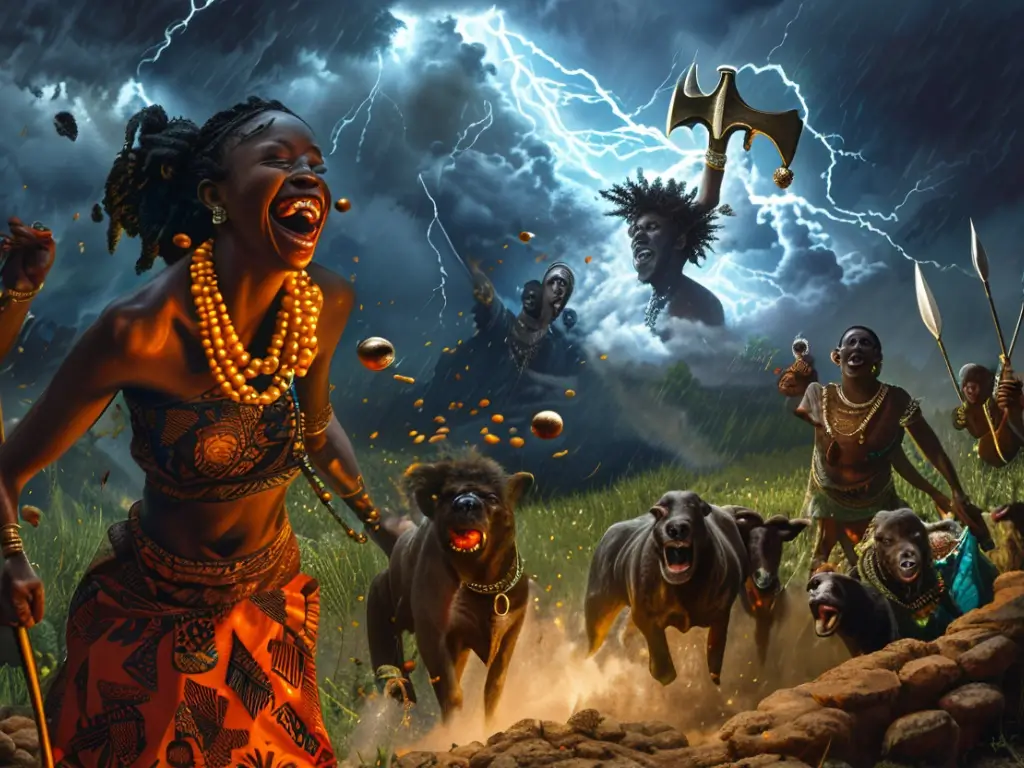In ancient Ruanda, Imana was sometimes linked with thunder and lightning, as sky-gods often are. Yet in this tale the Thunder is treated as a distinct being, not the same as Imana.
There was once a woman, wife of Kwisaba. When Kwisaba went to war, his wife remained at home. One day she fell gravely ill. Too weak even to light a fire, she cried out in despair:
“Oh, if only someone would split the kindling for me! If someone would build the fire—even if it were the very Thunder of heaven himself!”
At once clouds gathered. Darkness filled the hut, lightning flashed, and the Thunder appeared in the form of a man, holding a shining axe. In an instant he split the wood and lit the fire with a touch of his fingers, which burned like torches. Then he turned to the woman:
“Now, wife of Kwisaba, what will you give me?”
Frightened, she could not answer. He pressed her: “When your child is born, if it is a girl, will you give her to me as wife?” Trembling, she whispered, “Yes.” Then Thunder vanished.
A daughter was born, strong and healthy, and they named her Miseke. When Kwisaba returned from war, he was glad to hear he had a daughter—but troubled when his wife told him of her vow to Thunder. He warned, “If she grows up, never let her stray outside, or Thunder will take her.”
Miseke grew quickly. One day, her friends noticed something strange: whenever she laughed, beads and bangles fell from her mouth. Her father said, “These are Thunder’s gifts, sent as bridal presents. We must guard her.” And so Miseke lived shut indoors, weaving mats and baskets, longing for the company of her friends.
When she was about fifteen, her playmates begged her to join them to dig white clay, inkwa. Her parents refused. But one day, while they were away at the garden, the girls persuaded her, and she went.
As they dug, clouds gathered, darkness fell, and Thunder appeared, calling, “Where is Miseke, daughter of Kwisaba?” The girls tried to protect her, but when Miseke laughed, a shower of beads betrayed her. Thunder seized her and carried her away to the sky, making her his bride.
Though frightened at first, she found Thunder kind. She bore him three children—two boys and a girl. When the youngest was born, she asked to visit her parents. Thunder agreed, sending her with cattle, servants, and gifts, but warned: “Keep to the high road. Do not take the bypath.”
Her carriers, however, strayed into a forbidden way. There they met an ogre, an igikoko, who demanded food. Miseke offered beer, but the monster drank it all, then devoured the cattle, servants, and even her children—save the eldest, whom she sent running to her grandfather’s homestead for help.
The boy reached his family, who came with hunting dogs and spears. They slew the ogre. As it died, it said, “Cut off my big toe, and you will recover all that I have swallowed.” They did so, and out came the cattle, servants, and children, alive and unharmed.
Miseke returned to her parents with great joy. For a month she stayed, feasted, and was honored. But when it came time to return, clouds gathered suddenly, and Miseke with her children, servants, and gifts were swept back into the sky. Her family never saw her again.
The tale leaves her there, dwelling with Thunder, her strange and powerful husband, in what we may presume was happiness everlasting.
